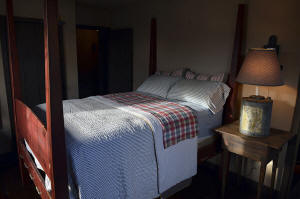How much sleep do you really need? Experts say it depends
[March 15, 2025]
By DEVNA BOSE
Chances are, if you’re reading this, you got some sleep last night. But
are you feeling rested?
Experts say it's an important question to consider.
Most of us spend a third of our lives sleeping, but you may need more or
less than eight hours a night. The number of hours needed changes
throughout your life, with babies and kids needing more sleep and people
65 and older able to function on slightly less than seven to nine hours.
Here’s what sleep scientists and doctors say about how much you really
need — and whether your gender plays a role.
Sleep quality over quantity
Sleep is still a mystery, despite how critical it is for our health.
“The reasons aren’t entirely clear, but it’s an essential thing that we
all do,” said Dr. Rafael Pelayo, a sleep specialist at Stanford
University. “Something remarkable happens when you sleep. It’s the most
natural form of self-care that we have.”
Most of the population gets between seven to nine hours — and that
particular category has the lowest association with health problems,
said Molly Atwood, a behavioral sleep medicine clinician at Johns
Hopkins.
Once people either dip into less than six hours of sleep or get more
than nine hours on average, the risk of health problems inches up,
Atwood said, but everybody is different.
When you’re trying to figure out how much sleep you need, it’s important
to think about the quality of it, Pelayo said: “What you really want to
do is wake up feeling refreshed — that’s what it’s about.”
“If somebody tells me that they sleep many hours but they wake up tired,
something is wrong," Pelayo said. "You shouldn’t leave your favorite
restaurant feeling hungry.”

How much sleep we need changes
The amount of sleep we need changes throughout our lives. Newborns need
the most — somewhere between 14 to 17 hours.
“Definitely when we’re babies and children, because we are growing so
rapidly, we do need a lot more sleep,” Atwood said.
The National Sleep Foundation recommends most adults between 26 and 64
get between seven to nine hours of sleep. People who are 65 and older
can get slightly less, and young adults between ages 16 and 25 can get
slightly more.
Humans cycle through sleep stages roughly every 90 minutes. In the first
portion of the night, Atwood said that more of the cycle is slow wave
sleep, or deep sleep, which is essential to repairing and restoring the
body. It’s also when “growth hormone” is released.
In the latter hours of the night, more of the sleep cycle is spent in
rapid-eye movement sleep, or dream sleep, which is important for
learning and memory consolidation, or the process in which short-term
memory gets turned into long-term memory.
[to top of second column]
|

A shaft of light shines into a bedroom in Belle, W.Va., on Nov. 11,
2013. (Craig Cunningham/The Daily Mail via AP, File)
 Kids get more “deep sleep,” with
about 50% of the night in that realm, she said. That drops at
adolescence, Atwood said, because our body doesn’t need the same
kind of repair and restoration.
Something else interesting happens around puberty: Gender-based
differences in sleep start to crop up.
Do women need more sleep than men?
Research doesn’t show that women need more sleep — but women do get
slightly more sleep on average than men, Atwood said.
It starts at a young age. Though they have the same sleep needs,
teenage girls seem to get less sleep than teenage boys, Pelayo said.
Additionally, teenage girls tend to complain of insomnia more
frequently.
When women become first-time mothers, they often care for newborns
throughout the night more frequently, which means less sleep, said
Allison Harvey, a clinical psychologist and professor who studies
sleep at UC Berkeley.
Hormones may also impact women's sleep quantity and quality during
pregnancy and menopause.
“With menopause in particular, women can develop deterioration in
their sleep with an increased number and duration of nighttime
awakenings,” said Dr. Mithri Junna, a Mayo Clinic neurologist who
specializes in sleep.
Atwood said women may also need more sleep right before their
menstrual cycle.
“There are definitely times that your body’s telling you that you
need more sleep,” she said. “It’s important to listen.”
When to seek help sleeping
You'll know if you’re not getting enough sleep if you're feeling
grumpy, irritable and inattentive. Long-term, those minor symptoms
can become serious problems — even deadly.
“If you’re not getting enough sleep or you have untreated insomnia
or sleep apnea, your risk of depression increases,” Atwood said.
“Your risk of cardiovascular issues like high blood pressure, risk
of heart attack and stroke increases. Your immune system is
compromised. You’re at greater risk for Alzheimer’s.”
If you’re getting the recommended amount of sleep every night but
still waking up feeling tired, you might consider going to your
primary care physician. They can rule out other health conditions
that may affect your sleep, Atwood said. But if problems persist,
seeking out a sleep specialist could be helpful.
All contents © copyright 2025 Associated Press. All rights reserved |